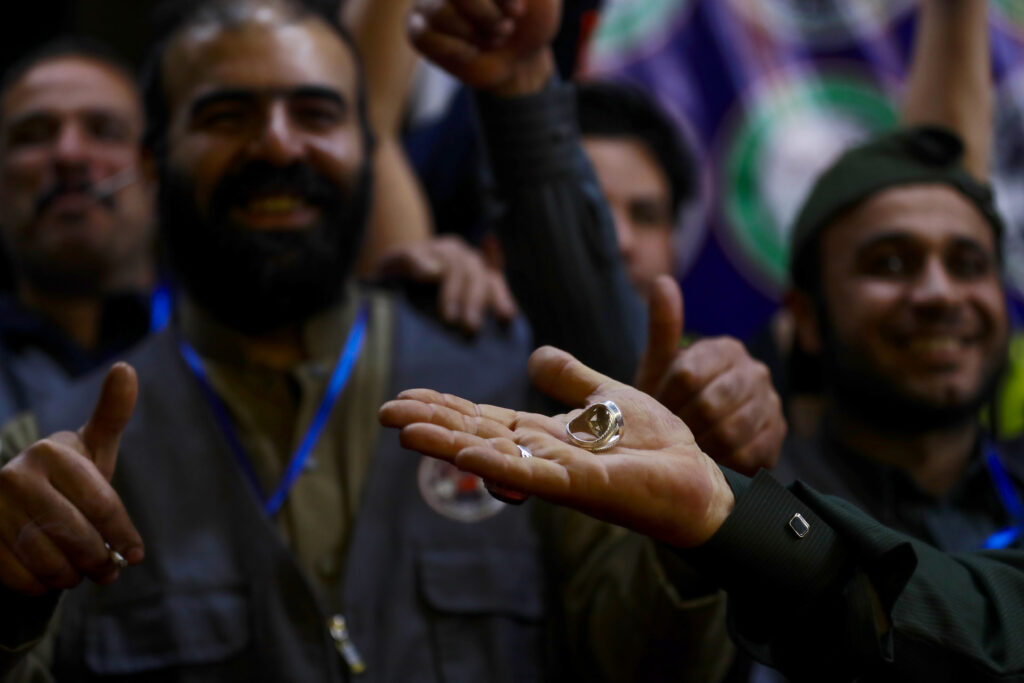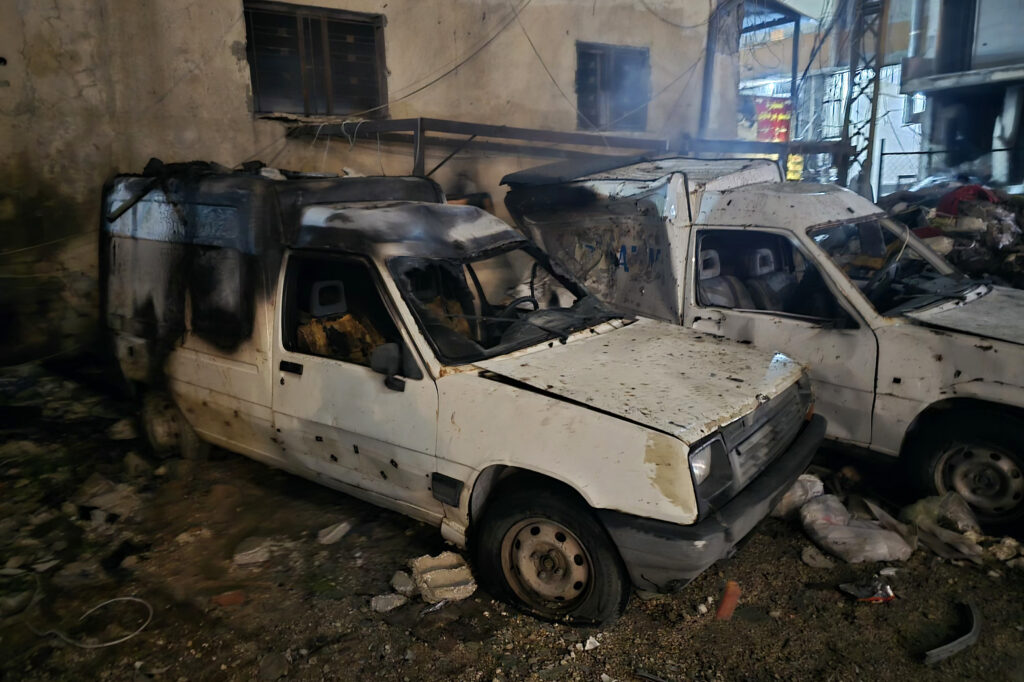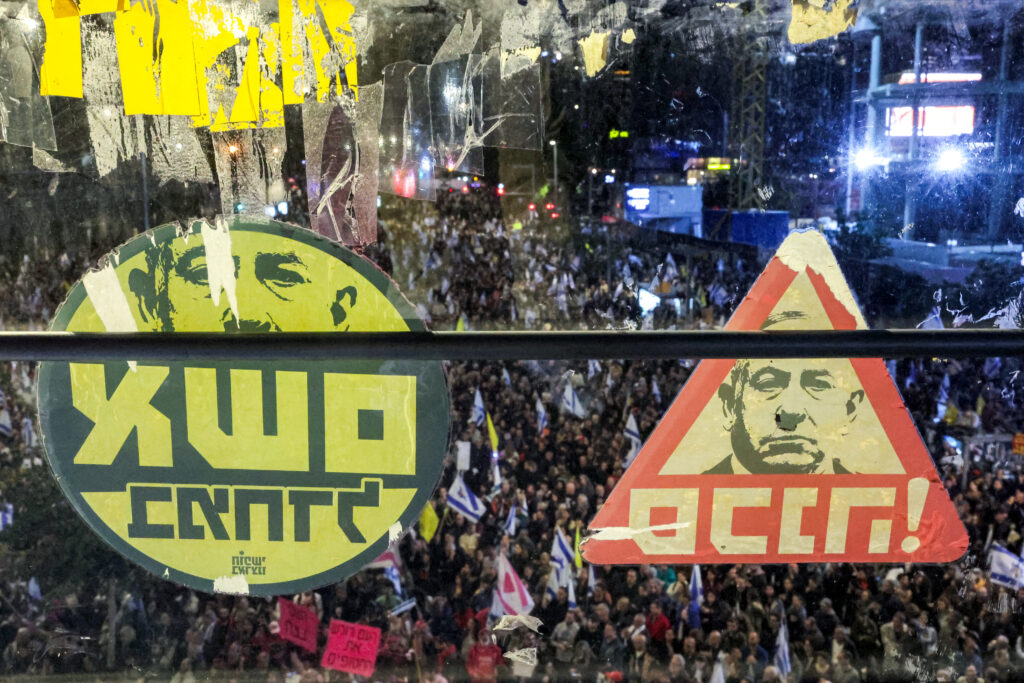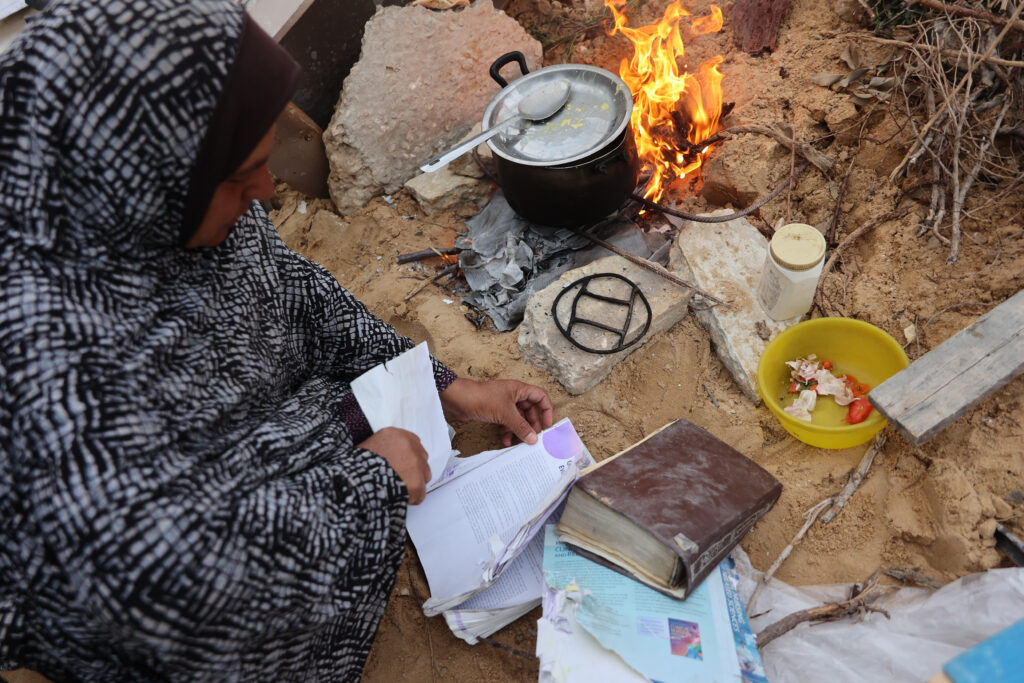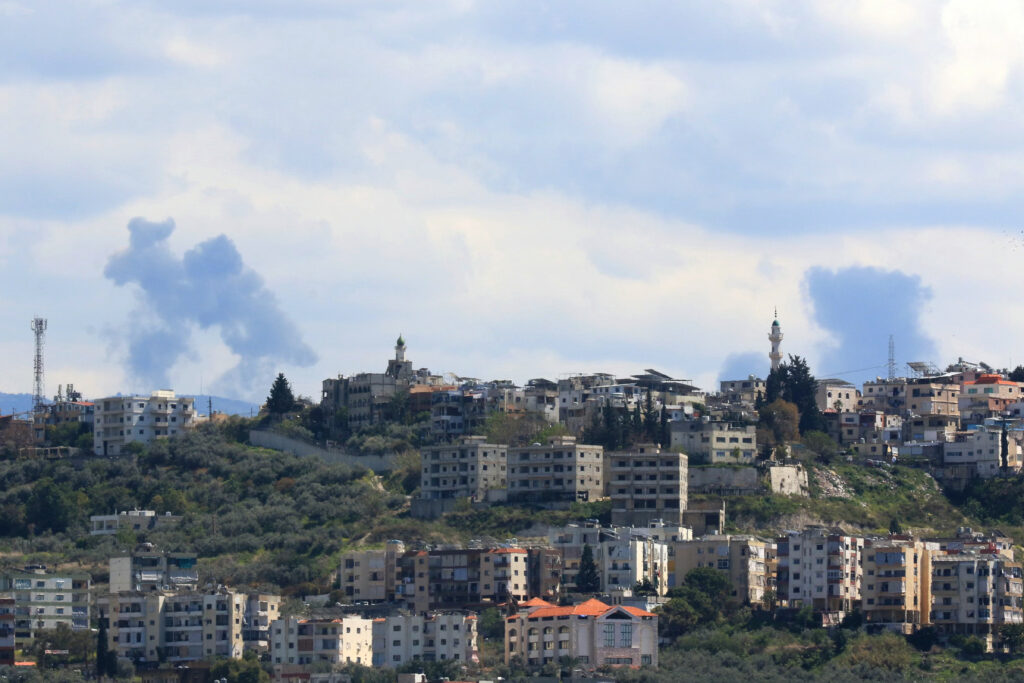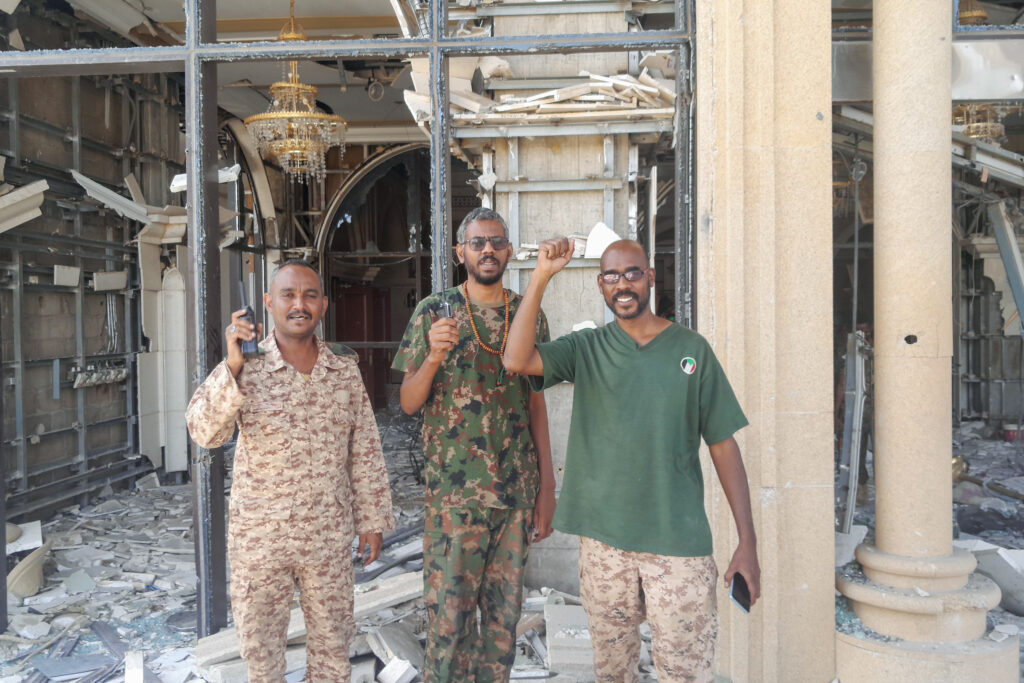AFP Asia Business
Iraqis find Ramadan joy in centuries-old ring game
In a Baghdad arena, a crowd cheers to the rhythm of drums, not for a football match but for a fiery centuries-old game enjoyed by Iraqis during Ramadan called “mheibes”.”It’s a heritage game, the game of our ancestors, which unites all Iraqis,” said Jassem al-Aswad, a longtime mheibes champion in his early seventies and now president of the game’s national federation.The game involves members of one team hiding a ring — “mehbis” in Arabic — and the captain of the opposing team trying to guess who has it in the palm of his hand.And he has to do so within 10 minutes.Played during the holy Muslim fasting month of Ramadan, the game first appeared as early as the 16th century in Ottoman-era Baghdad, according to Iraqi folklore expert Adel al-Ardawi.More than 500 fans and players gathered in the stands and on the field for two matches: the Baghdad neighbourhood of Kadhimiya against the southern city of Nasiriyah, and the capital’s Al-Mashtal district versus a team from the port city of Basra.Everyone watched as the 40 players on one team huddled together under a blanket to avoid prying eyes, and decided who would hide the “mehbis” or signet ring worn by many Iraqi men.Sitting on the ground or on chairs, the members of the team hiding the ring then adopted serious expressions. Some closed their eyes, while others crossed their arms or even clenched their fists.The rival team captain carefully read these facial expressions and body language to try and guess who had the ring — before pronouncing the verdict.When the first team failed to guess correctly, the other team scored a point and the crowd went wild. – ‘It’s in our blood’ -“Iraqis love football the most, but mheibes comes a close second. It’s in our blood,” Kadhimiya captain Baqer al-Kazimi told AFP.The clean-shaven 51-year-old, who wears a black robe called a jellaba, said he inherited his love of the game from his father.Though mheibes was impacted during decades of conflict, including at the peak of the sectarian war between 2006 and 2008 marked by suicide attacks and kidnappings, Kazimi said he and others continued playing even during those dark years. He said that only the coronavirus pandemic forced players to put their hobby on hold.”Despite the sectarian violence, we played in cafes,” he said, recalling one game between players from the Sunni neighbourhood of Adhamiya and those from Kadhimiya, a predominantly Shiite area.The two districts were separated by a bridge that had been closed for years because of the violence.”We played on the bridge. Sunnis and Shiites met,” he said. Ahmed Maala from Basra recalled a game with a team from Baghdad that lasted all night. “I learned the game by playing with friends and family,” he said.”Mheibes will go down in history for its very large fan base throughout Iraq.”Passion for the game runs so deep that sometimes arguments erupt among players, even escalating into physical violence.In a country with nearly 400 teams, annual competitions see players from across the nation competing against each other, with 10 teams qualifying in Baghdad alone to represent the city’s different neighbourhoods.Mheibes champion Aswad said he hopes the game will one day expand beyond Iraq’s borders. “Just as Brazil popularised football, we will transmit this game to the whole world,” he said.
Israel launches more strikes on Lebanon after rocket fire
Israel launched a new wave of strikes on Lebanon in response to a rocket attack from across the border on Saturday, as militant group Hezbollah denied responsibility for the launch.Israeli Prime Minister Benjamin Netanyahu and Defence Minister Israel Katz ordered “a second wave of strikes against dozens of Hezbollah targets in Lebanon”, the defence ministry said, in the largest escalation since a November 27 ceasefire.It said the strikes were “a response to rocket fire towards Israel and a continuation of the first series of strikes carried out this morning” against southern Lebanon.Lebanon’s official National News Agency reported one girl among five people killed in an Israeli strike during the day on the southern town of Touline.The agency later said three people were killed in an Israeli strike on the city of Tyre, targeted in the second wave of strikes on the south and east, with multiple injuries also reported.Bilal Kachmar, spokesman for the Tyre Disaster Management Unit, told AFP two people were killed and two wounded when “an Israeli strike targeted an apartment in a residential building in the Al-Raml neighbourhood of Tyre”, a key coastal city targeted for the first time since the ceasefire.A security source told AFP that a Hezbollah official was targeted in the Tyre strike, without confirming whether he had been killed.- Hezbollah denial -Israel’s military said six rockets, three of which were intercepted, were fired from Lebanon into northern Israel Saturday, setting off air raid sirens.Hezbollah denied any involvement in the rocket attack, and called Israel’s accusations “pretexts for its continued attacks on Lebanon”.Hezbollah said it stands “with the Lebanese state in addressing this dangerous Zionist escalation on Lebanon”.While Hezbollah has long held sway over parts of Lebanon bordering Israel, other Lebanese and Palestinian groups have also carried out cross-border attacks.Lebanese Prime Minister Nawaf Salam warned that renewed military operations on the southern border risked “dragging the country into a new war”, his office said.Foreign Minister Youssef Raggi called for “pressure on Israel to stop the aggression and escalation and contain the dangerous situation on the southern borders”.Israeli defence chiefs say they hold the Lebanese government responsible for all hostile fire from its territory, regardless of who launches it.”We cannot allow fire from Lebanon on Galilee communities,” Israeli Defence Minister Katz said of towns and villages in the north, many of which were evacuated after Hezbollah began firing at Israel in support of Hamas in October 2023.”The Lebanese government is responsible for attacks from its territory.”- UN ‘alarmed’ -The United Nations peacekeeping force in southern Lebanon said it was “alarmed by the possible escalation of violence” following Saturday morning’s rocket fire.France, which helped broker the ceasefire, condemned the rocket fire and urged Israel to show “restraint”, while Jordan called for immediate international action to “stop the Israeli aggression against Lebanon”.Hezbollah has long had strongholds in south and east Lebanon, as well as south Beirut, but the war with Israel dealt the group devastating blows, leaving it massively weakened.Under the ceasefire, Hezbollah is supposed to pull its forces north of the Litani River, about 30 kilometres (20 miles) from the Israeli border, and dismantle any remaining military infrastructure in the south.Israel is supposed to withdraw its forces across the UN-demarcated Blue Line, the de facto border, but has missed two deadlines to do so and continues to hold five positions it deems “strategic”.Israel has carried out repeated air strikes during the ceasefire, targeting what it said were Hezbollah military sites that violated the agreement.The Lebanese army said it had dismantled three makeshift rocket batteries in an area north of the Litani on Saturday.- Hamas official killed -The flare-up came just days into Israel’s renewed offensive in Gaza, which shattered the relative calm in the territory since a January 19 ceasefire.Israel resumed air strikes on Gaza on Tuesday before sending troops back into areas evacuated during the pause in fighting.Katz said Friday he had ordered the army to “seize more territory in Gaza”.On Saturday in Gaza City, Sameh al-Mashharawi said “seven people were martyred” in a strike on his family’s house that killed his two brothers, their children and wives.An Israeli air strike that hit a tent encampment in southern Gaza killed senior Hamas political official Salah al-Bardawil and his wife, a Hamas source told AFP early Sunday.Israel says its military campaign is necessary to pressure Hamas into releasing the remaining hostages, dead or alive.Hamas has accused Israel of sacrificing the hostages with the resumed bombardments, while many of the families of the captives have called for a renewed ceasefire, noting that most of those released alive did so during truce periods.
Israel opposition urges general strike over security chief ouster
Israel’s opposition leader on Saturday called for a general strike if Prime Minister Benjamin Netanyahu refuses to obey a Supreme Court decision freezing the government’s dismissal of the internal security chief.If the government “decides to disobey the Court’s decision it will become a government outside of the law,” Yair Lapid told thousands of demonstrators in central Tel Aviv.”If that happens, the entire country should stop,” he said. “The only system that must not stop is the security system.”The unprecedented move to fire Shin Bet chief Ronen Bar has deepened divisions in the country as Israel resumes its military operations in the Gaza Strip.Attorney General Gali Baharav-Miara said on Friday that Netanyahu could not name a replacement for Bar, following the Supreme Court decision.Netanyahu insisted, in a post on X, that it was up to the government to decide who headed the domestic security agency. “There will be no civil war! The State of Israel is a state of law, and according to the law, the government of Israel decides who will be the head of the Shin Bet,” the prime minister said.He reiterated that view in a video message Saturday as the Tel Aviv protest was under way.”Ronen Bar will not stay as head of Shin Bet,” he said. “There will not be civil war, and Israel will remain a democratic state.”- ‘Flagrant conflict of interest’ -Demonstrators have spoken of Netanyahu’s policies, including the firing of Bar, as a threat to Israel’s democracy.Lapid spoke at an anti-government rally where demonstrators held signs protesting the war in the Gaza Strip and calling for hostages held there to be freed.Signs read “No more bloodshed” and “Stop the war, Now!” to ensure the return of the 58 hostages captured on October 7, 2023 and still held in Gaza.In front of the defence ministry headquarters, Menahem Begin Street was packed from Kaplan Street to King Saul Street, an AFP photographer observed, suggesting a crowd of several tens of thousands of people, a very significant mobilization on a national scale.Lapid’s party Yesh Atid, which appealed Bar’s firing to the Supreme Court, denounced the government move to sack Bar as “a decision based on flagrant conflict of interest”.The government is to meet on Sunday to begin dismissal proceedings against the attorney general, a vocal Netanyahu critic, citing “prolonged disagreements”.A demonstration against her removal is scheduled for Sunday outside parliament, and near Netanyahu’s Jerusalem residence.
Fatah urges Hamas to cede power to safeguard ‘Palestinians’ existence’
Palestinian president Mahmud Abbas’s Fatah movement called on its Islamist rivals Hamas on Saturday to relinquish power in order to safeguard the “existence” of Palestinians in the Gaza Strip.”Hamas must show compassion for Gaza, its children, women and men,” Fatah spokesman Monther al-Hayek said in a message sent to AFP from Gaza.He called on Hamas to “step aside from governing and fully recognise that the battle ahead will lead to the end of Palestinians’ existence” if it remains in power in Gaza.Hamas seized power in Gaza in 2007 from the Fatah-dominated Palestinian Authority, and subsequent attempts at reconciliation have failed.The territory has been devastated by an Israeli offensive in retaliation for the attack by Hamas and other Palestinian militants on Israel on October 7, 2023.Hamas has said repeatedly it is willing to leave power in Gaza once the war is over but categorically excludes giving up its weapons.”We are ready to accept any agreement regarding the administration of Gaza (post-war), and are not interested in participating in it,” Hamas spokesman Abdul Latif al-Qanou said in a statement Saturday.”What’s important to us is the national consensus,” he added, recalling that Hamas has endorsed an Egyptian proposal for an independent committee of professionals and technocrats to manage Gaza post-war and oversee reconstruction.Abbas says the committee must report to the Ramallah-based Palestinian Authority, the sole legitimate entity to govern Gaza according to him, but Israeli Prime Minister Benjamin Netanyahu’s government has rejected this.Following disagreement over the next steps in a January 19 ceasefire in the Gaza war, Israeli resumed air strikes on Tuesday, followed by ground operations the day after.On Friday, Israeli Defence Minister Israel Katz threatened to annex parts of Gaza unless Hamas frees the remaining Israeli hostages seized in the October 7 attack.Of the 251 hostages taken that day, 58 are still being held, including 34 the Israeli military says are dead.Hamas’s 2023 attack on Israel resulted in 1,218 deaths, mostly civilians, according to Israeli figures.Nearly 50,000 people in Gaza have been killed in the war, according to the Hamas-run territory’s health ministry.The latest Israeli offensive has caused a new exodus of thousands of Palestinians from Gaza.”We are exhausted by the cycle of displacement,” Ramadan Houdoud told AFP in a tent camp in Al-Zawayda in the centre of the territory, after fleeing from Gaza City.Displaced woman Umm Khaled lamented the destruction, adding: “There is no water, no food, and no rest.””Where can we go? We need a solution. Are there really no more Muslims to help us?” she asked.
Israel launches more strikes on Lebanon after cross-border rocket fire
Israel launched a new wave of strikes on Lebanon in response to a rocket attack from across the border on Saturday, as militant group Hezbollah denied responsibility for the launch.Israeli Prime Minister Benjamin Netanyahu and Defence Minister Israel Katz ordered “a second wave of strikes against dozens of Hezbollah targets in Lebanon”, the defence ministry said, in the largest escalation since a November 27 ceasefire.It said the strikes were “a response to rocket fire towards Israel and a continuation of the first series of strikes carried out this morning” against southern Lebanon.Lebanon’s official National News Agency reported one girl among five killed in an Israeli strike during the day on the southern town of Touline.The agency later said another person was killed in an Israeli strike on the key coastal city of Tyre, one of the targets of the new wave of strikes on the south and east, with multiple injuries reported.Ali Safieddine, of Tyre’s civil defence, confirmed to AFP the toll of one dead and said 15 were injured.- Hezbollah denial -The Israeli army said six rockets, three of which were intercepted, had been fired from Lebanon into northern Israel, setting off air raid sirens in the region.Hezbollah denied any involvement in the rocket attack, and called Israel’s accusations “pretexts for its continued attacks on Lebanon”.Hezbollah said that it stands “with the Lebanese state in addressing this dangerous Zionist escalation on Lebanon”.While Hezbollah has long held sway over parts of Lebanon bordering Israel, other Lebanese and Palestinian groups have also carried out cross-border attacks. Lebanese Prime Minister Nawaf Salam warned that renewed military operations on the southern border risked “dragging the country into a new war,” his office said.Lebanon’s top diplomat Youssef Raggi called for “pressure on Israel to stop the aggression and escalation and contain the dangerous situation on the southern borders”.But Israeli defence chiefs said they held the Lebanese government responsible for all hostile fire from its territory regardless of who launched it.”We cannot allow fire from Lebanon on Galilee communities,” Israeli Defence Minister Israel Katz said, referring to towns and villages in the north, many of which were evacuated after Hezbollah began firing on Israel in support of Hamas in October 2023.”The Lebanese government is responsible for attacks from its territory. I have ordered the military to respond accordingly,” Katz said.- UN ‘alarmed’ -The United Nations peacekeeping force in southern Lebanon said it was “alarmed by the possible escalation of violence” following the morning’s rocket fire.Hezbollah has long had strongholds in south and east Lebanon, as well as south Beirut, but the war with Israel dealt the group devastating blows, leaving it massively weakened.Under the ceasefire, Hezbollah is supposed to pull its forces back north of the Litani River, about 30 kilometres (20 miles) from the Israeli border, and dismantle any remaining military infrastructure in the south.Israel is supposed to withdraw its forces across the UN-demarcated Blue Line, the de facto border, but has missed two deadlines to do so and continues to hold five positions it deems “strategic”.Israel has carried out repeated air strikes during the ceasefire, targeting what it said were Hezbollah military sites that violated the agreement.The Lebanese army said it had dismantled three makeshift rocket batteries in an area north of the Litani on Saturday.The mayor of the Israeli border town Metula, targeted in Saturday’s rocket launch, urged authorities to “act offensively and make it so that not one bullet is fired ever again at northern communities”. – Seven ‘martyred’ in Gaza -Saturday’s flare-up came five days into Israel’s renewed offensive against Hamas militants in Gaza, which shattered the relative calm since a January 19 ceasefire there.On Saturday in Gaza City, Sameh al-Mashharawi said “seven people were martyred” in a strike on his family’s house that killed his two brothers, their children and wives.Israel’s defence minister said Friday that he had ordered the army to “seize more territory in Gaza”.”The more Hamas refuses to free the hostages, the more territory it will lose, which will be annexed by Israel,” Katz said.When the first stage of the Gaza ceasefire expired early this month, Israel rejected negotiations for the promised second stage, calling instead for the return of all its remaining hostages under an extended first stage.That would have meant delaying talks on a lasting ceasefire, and was rejected by Hamas as an attempt to renegotiate the original deal mediated by the US, Qatar and Egypt.
Sudan army advances in central Khartoum after retaking palace
Sudan’s military said Saturday it seized several key buildings in central Khartoum from paramilitary control after army chief Abdel Fattah al-Burhan promised “full liberation” following the recapture of the presidential palace.Army spokesman Nabil Abdallah said the military was “continuing to pressure” the Rapid Support Forces throughout the city centre, giving a list of buildings recaptured including the Central Bank, state intelligence headquarters and the Sudan National Museum.Despite its advances in the capital, Africa’s third largest country remains effectively split in two, with the army holding the east and north while the RSF controls nearly all of the western region of Darfur and parts of the south.Activists on Saturday said dozens of civilians had been killed in a paramilitary attack in a remote part of North Darfur state, hundreds of kilometres (miles) from the capital.Sudan’s national institutions in Khartoum’s centre were all overrun and looted by paramilitaries in the first weeks after fighting erupted in April 2023.An RSF source confirmed to AFP that its fighters had “withdrawn from some locations in central Khartoum,” but added “the battle has not been decided yet”.”Our forces are now waging a fierce battle” near the airport, he said on condition of anonymity.RSF fighters remain inside what remains of the airport, which has been heavily damaged during nearly two years of fighting.On Friday, the army and allied armed groups retook the presidential palace from the RSF, which retaliated with a drone strike that killed three members of a Sudanese TV crew and several army personnel.The paramilitaries had used the palace to house their elite forces and stockpile ammunition, according to military sources.Photos showed parts of the palace blasted away by battle damage. Built with Chinese funding, the building on the Blue Nile river opened about a decade ago.The battle for Khartoum’s city centre could consolidate the military’s hold on the capital region but is unlikely to end the war.With its advance on Friday, the army has taken the entire south side of the Blue Nile, which separates the capital from Khartoum North. It has also secured the main road route across the White Nile from the city centre to Khartoum’s twin city of Omdurman.Since April 2023, the military led by army chief Abdel Fattah al-Burhan has fought the RSF, headed by his former deputy, Mohamed Hamdan Daglo.After a year and a half of defeats, the tide seemed to turn late last year, when an army counteroffensive through central Sudan led to its recapture of much of Khartoum.- Battle ‘not over’ -In a video shared by the army on Saturday, Burhan said his forces were “advancing with steady steps towards the full liberation of Sudan”.”The battle is not over, we will continue,” he said to cheers and ululations in al-Kamlin, a town about 100 kilometres (62 miles) southwest of Khartoum, the day before.Army sources said the paramilitaries withdrew into buildings in al-Mogran, an area just west of the palace housing banks and business headquarters.The paramilitaries posted snipers in the district’s high-rises, which overlook both Omdurman and the government ministries of central Khartoum.”Our forces in central Khartoum are continuing to pressure the Daglo thugs … (who) are trying to escape from our forces,” said Abdallah, the army spokesman.He said the army had “eliminated hundreds of militia members who tried to escape through pockets in central Khartoum.”Analysts cautioned that even if the army went on to recapture the whole of greater Khartoum, it would not spell the end of Sudan’s war, which has killed tens of thousands of people and uprooted more than 12 million.Facing successive army victories in central Sudan, the RSF has redoubled its efforts to consolidate its hold on Darfur, where its resupply links from Libya have come under increasing attack in recent months by army-allied armed groups known as the Joint Forces.On Saturday, activists said a paramilitary attack on the North Darfur town of Al-Malha killed at least 45 civilians. RSF on Thursday said it had seized the town.The resistance committee, a volunteer aid group in North Darfur state capital El-Fasher, about 200 kilometres (124 miles) southwest, said it was unable to identify 15 other “victims of the al-Malha massacre”.
Girl among two dead as Israel strikes Lebanon after cross-border rocket fire
Israel conducted deadly strikes on Lebanon Saturday in response to a rocket attack from across the border, as militant group Hezbollah denied responsibility for the launch.Lebanon’s official National News Agency reported one girl among two killed in an Israeli strike on the southern town of Touline, during the largest escalation since a November 27 ceasefire.The Israeli army said six rockets, three of which were intercepted, were fired from Lebanon into northern Israel, setting off air raid sirens in the region for the first time since November.”Hezbollah denies any involvement in the rocket fire from southern Lebanon into the occupied Palestinian territories (Israel),” the Iran-backed group said in a statement, calling Israel’s accusations “pretexts for its continued attacks on Lebanon”.Hezbollah said that it stands “with the Lebanese state in addressing this dangerous Zionist escalation on Lebanon”.While Hezbollah has long held sway over areas of Lebanon bordering Israel, other Lebanese and Palestinian groups have also carried out cross-border attacks. Lebanese Prime Minister Nawaf Salam warned that renewed military operations on the southern border risked “dragging the country into a new war,” his office said.But Israeli defence chiefs said they held the Lebanese government responsible for all hostile fire from its territory regardless of who launched it.Analysts have said the weakening of Hezbollah during its war with Israel enabled Lebanon’s long-deadlocked parliament to in January name army chief Joseph Aoun as president, with backing from the United States, Saudi Arabia and others.Upon taking office, Aoun pledged to usher in a new era in which the Lebanese state would have a “monopoly on weapons”.”We cannot allow fire from Lebanon on Galilee communities,” Israeli Defence Minister Israel Katz said, referring to towns and villages in the north, many of which were evacuated after Hezbollah began firing on Israel in support of Hamas in October 2023.”The Lebanese government is responsible for attacks from its territory. I have ordered the military to respond accordingly,” Katz said.NNA said Israeli air strikes and shelling had targeted several areas of the south.One strike killed two people including a girl in Touline, NNA reported after earlier saying Israeli strikes wounded two people several kilometres (miles) further east in the border village of Kfar Kila.- UN ‘alarmed’ -The United Nations peacekeeping force in southern Lebanon said it was “alarmed by the possible escalation of violence” following the morning’s rocket fire.”We strongly urge all parties to avoid jeopardising the progress made, especially when civilian lives and the fragile stability observed in recent months are at risk,” it said.Hezbollah has long had strongholds in south and east Lebanon, as well as south Beirut, but the war with Israel dealt the group devastating blows, including the killing of longtime chief Hassan Nasrallah.Under the ceasefire, Hezbollah is supposed to pull its forces back north of the Litani River, about 30 kilometres (20 miles) from the Israeli border, and dismantle any remaining military infrastructure in the south.Israel is supposed to withdraw its forces across the UN-demarcated Blue Line, the de facto border, but has missed two deadlines to do so and continues to hold five positions it deems “strategic”.Israel has carried out repeated air strikes during the ceasefire, targeting what it said were Hezbollah military sites that violated the agreement.The Lebanese army said it had dismantled three makeshift rocket batteries in an area north of the Litani on Saturday.The mayor of the Israeli border town Metula, across from Kfar Kila, urged the authorities to “act offensively and make it so that not one bullet is fired ever again at northern communities”. Metula was targeted by the rockets.- Seven ‘martyred’ in Gaza -Saturday’s flare-up came five days into Israel’s renewed offensive against Hamas militants in Gaza, which shattered the relative calm since a January 19 ceasefire there.On Saturday in Gaza City, Sameh al-Mashharawi said “seven people were martyred” in a strike on his family’s house that killed his two brothers, their children and wives.Israel’s defence minister said Friday that he had ordered the army to “seize more territory in Gaza”.”The more Hamas refuses to free the hostages, the more territory it will lose, which will be annexed by Israel,” Katz said.The White House said Israel consulted US President Donald Trump’s administration before launching its Gaza strikes. Israel said it “fully coordinated” with Washington.Hamas took issue Saturday with Washington’s characterisation of its position, insisting that it stood ready to release all its remaining hostages as part of a second stage of the ceasefire.”The claim that ‘Hamas chose war instead of releasing the hostages’ is a distortion of the facts,” the group said.When the first stage of the ceasefire expired early this month, Israel rejected negotiations for the promised second stage, calling instead for the return of all its remaining hostages under an extended first stage.That would have meant delaying talks on a lasting ceasefire, and was rejected by Hamas as an attempt to renegotiate the original deal mediated by the US, Qatar and Egypt.

